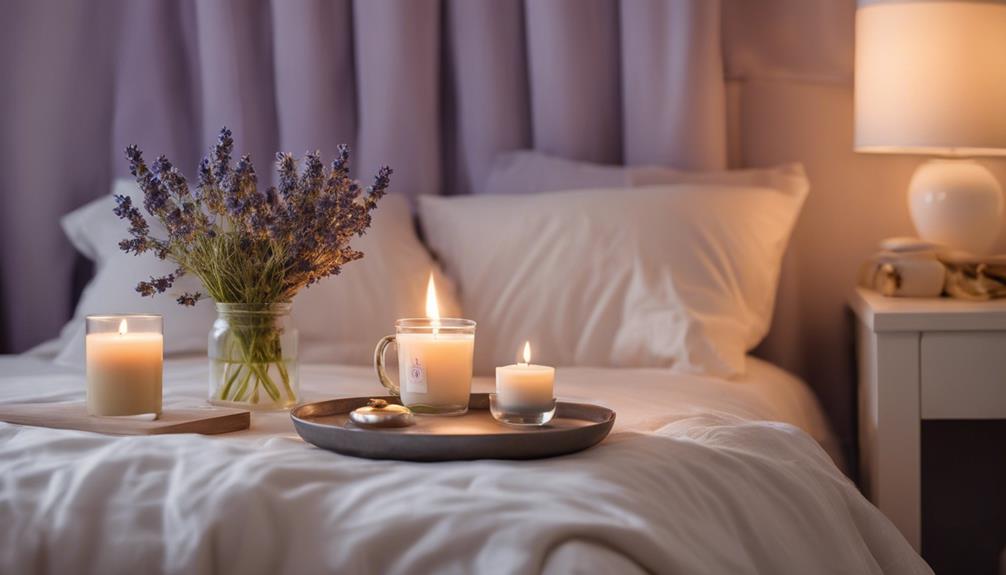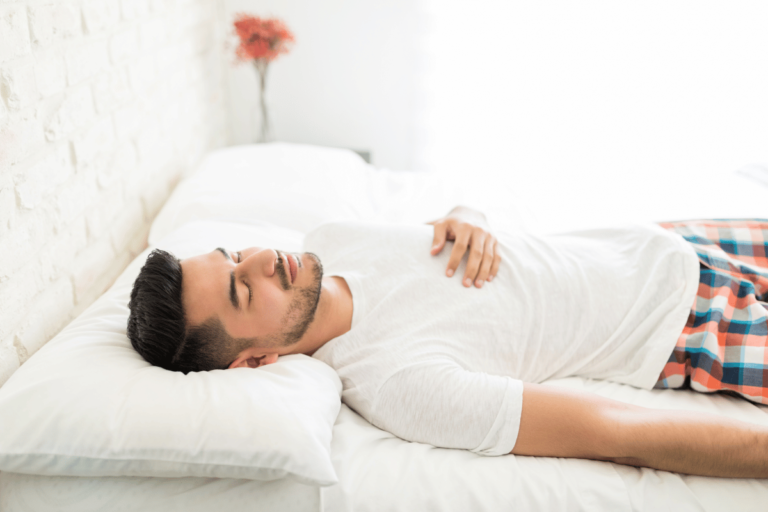How Can I Get a Good Night's Sleep?
You might think that getting a good night's sleep is easier said than done, especially with the hustle and bustle of modern life. But, there are practical steps you can take to improve your sleep quality.
From creating a calming bedtime routine to optimizing your sleep environment, there are various strategies that can help you achieve a restful night's sleep.
So, if you're tired of tossing and turning, let's explore some effective tips to help you finally experience the rejuvenating rest you deserve.
Key Takeaways
- Establish a bedtime routine for a regulated internal clock.
- Create a comfortable sleep environment with quality bedding and calming lighting.
- Manage stress and anxiety through deep breathing, relaxation techniques, and mindfulness.
- Watch diet and hydration, limiting caffeine and including healthy nutrients for better sleep quality.
Establish a Relaxing Bedtime Routine
To ensure a restful night's sleep, it's essential to establish a calming bedtime routine that signals to your body and mind that it's time to unwind. Creating a consistent routine helps train your body to recognize when it's time to wind down and prepare for sleep. Start by setting a specific bedtime and wake-up time to regulate your body's internal clock.
Incorporate relaxation techniques into your bedtime routine to help ease your mind and body into a state of tranquility. This could include activities like reading a book, taking a warm bath, practicing deep breathing exercises, or listening to calming music. Engaging in these soothing activities signals to your brain that it's time to relax and promotes a sense of calmness before sleep.
Create a Comfortable Sleep Environment
Creating a comfortable sleep environment is crucial for promoting restful and rejuvenating sleep each night. To ensure you set yourself up for a peaceful slumber, consider the following tips:
- Temperature Control: Keep your sleep environment cool and comfortable. A slightly cooler room temperature, around 60-67°F (15-19°C), can help signal your body that it's time to sleep.
- Lighting Choices: Opt for soft, warm lighting in the evening to signal to your body that it's time to wind down. Avoid bright, blue-light emitting screens that can disrupt your natural sleep-wake cycle.
- Invest in Quality Bedding: Choose bedding that feels soft and cozy to the touch. Comfortable sheets, pillows, and blankets can make a world of difference in how well you sleep.
- Declutter Your Space: A tidy and organized bedroom can help create a calming atmosphere. Remove distractions and clutter to promote a sense of peace and relaxation before bedtime.
Limit Screen Time Before Bed
Limiting screen time before bed is essential for improving the quality of your sleep and helping you relax effectively. The blue light exposure from screens can interfere with your body's production of melatonin, the hormone that regulates sleep.
To combat this, consider setting an electronic curfew at least an hour before bedtime. This means powering down devices such as smartphones, tablets, and laptops to allow your brain to wind down naturally.
Instead of scrolling through social media or watching TV, opt for a calming bedtime routine like reading a book, taking a warm bath, or practicing relaxation exercises.
Manage Stress and Anxiety
Managing stress and anxiety is crucial for achieving a restful night's sleep and promoting overall well-being. When stress and anxiety run high, it can be challenging to unwind and prepare your mind and body for quality rest. Here are some practical tips to help you manage stress and anxiety effectively:
- Deep Breathing Exercises: Take slow, deep breaths to calm your nervous system and reduce stress levels.
- Progressive Muscle Relaxation: Tense and relax each muscle group in your body to release physical tension and promote relaxation.
- Mindfulness Meditation: Practice staying present in the moment to alleviate anxious thoughts and promote a sense of calm.
- Journaling: Write down your thoughts and feelings to process emotions, gain clarity, and reduce anxiety.
Watch Your Diet and Hydration
Make sure you're fueling your body with balanced meals that support quality sleep. Remember to stay hydrated throughout the day to prevent disruptions in your sleep cycle.
It's wise to limit your intake of caffeine, especially later in the day, to promote a restful night's sleep.
Balanced Meals for Sleep
Ensuring that you consume balanced meals and stay hydrated throughout the day can significantly impact the quality of your sleep at night. Making wise nutrition choices plays a crucial role in promoting healthy sleep patterns. Here are some tips to help you plan your meals for better sleep:
- Include complex carbohydrates: Foods like whole grains, fruits, and vegetables can help regulate serotonin levels, enhancing relaxation.
- Opt for lean proteins: Protein sources such as poultry, fish, tofu, or legumes can promote stable blood sugar levels during sleep.
- Incorporate healthy fats: Foods rich in omega-3 fatty acids like nuts, seeds, and avocados can aid in better sleep quality.
- Limit caffeine and heavy meals: Avoiding large meals and stimulants close to bedtime can prevent disruptions in your sleep cycle.
Hydrate Throughout the Day
To optimize your sleep quality, maintaining proper hydration levels throughout the day is essential for overall well-being. Stay hydrated by drinking water consistently to support your body's functions, including promoting better sleep.
Dehydration can lead to discomfort, making it harder for you to fall asleep or stay asleep through the night. Aim to drink water regularly, especially during the day, to ensure your body is adequately hydrated when bedtime approaches. Avoid excessive consumption close to bedtime to prevent disruptions during the night.
Limit Caffeine Intake
Maintaining a balanced diet and staying mindful of your hydration levels are crucial steps in limiting your caffeine intake for better sleep quality. When it comes to improving your sleep hygiene and energy levels, watching your caffeine consumption is vital. Here are some practical tips to help you cut down on caffeine:
- Swap out that afternoon cup of coffee for decaffeinated tea.
- Opt for herbal teas in the evening to unwind without caffeine's interference.
- Be cautious of hidden sources of caffeine like chocolate and some medications.
- Gradually reduce your caffeine intake to avoid withdrawal symptoms and improve your sleep patterns.
Incorporate Regular Exercise
If you want to improve your sleep, incorporating regular exercise into your routine can be incredibly beneficial.
Consider the timing of your workouts, as exercising too close to bedtime might make it harder to fall asleep.
Exercise for Sleep
Regular physical activity plays a crucial role in promoting better sleep quality. Engaging in exercise can help regulate your sleep patterns and improve the overall quality of your rest.
Here are some ways exercise can benefit your sleep:
- Yoga stretches: Relax your body and mind before bedtime.
- Cardio benefits: Increase your heart rate during the day for better sleep at night.
- Stress reduction: Exercise is a great way to relieve stress, leading to a more peaceful sleep.
- Energy boost: Regular physical activity can help you feel more energized during the day and ready to rest at night.
Incorporating exercise into your routine can significantly improve your sleep quality.
Timing Matters
To optimize the benefits of exercise for your sleep, it's crucial to consider the timing of your physical activity routines. Exercise can significantly impact your sleep quality by aligning with your circadian rhythm.
Engaging in moderate exercise earlier in the day can help regulate your body clock, making it easier to fall asleep and improve the overall quality of your rest. However, vigorous workouts close to bedtime may have the opposite effect, as they can stimulate your body and mind, making it harder to wind down for sleep.
Consistency Is Key
Ensuring you engage in regular exercise is vital for maintaining a consistent sleep routine and optimizing your sleep quality. Exercise not only helps to tire your body physically but also aids in reducing stress and anxiety levels, which are common disruptors of sleep. Here are some key points to consider:
- Improves Sleep Hygiene: Regular physical activity can help regulate your internal body clock, making it easier to fall asleep and wake up at consistent times.
- Boosts Mood: Exercise releases endorphins that can improve your overall mood and reduce feelings of restlessness before bedtime.
- Enhances Relaxation: Engaging in activities like yoga or gentle stretching exercises can promote relaxation and prepare your body for sleep.
- Increases Energy Levels: Regular exercise can lead to feeling more energized during the day, making it easier to wind down and sleep better at night.
Set a Consistent Sleep Schedule
Maintaining a consistent bedtime can significantly improve your quality of sleep and overall well-being. Your body thrives on routine, and having a set sleep schedule helps regulate your circadian rhythm, which is essentially your body's internal clock. This consistency reinforces your natural sleep-wake cycle, making it easier for you to fall asleep and wake up feeling refreshed.
To enhance your sleep hygiene and optimize your rest, aim to go to bed and wake up at the same time every day, even on weekends. Consistency sends a powerful signal to your brain that it's time to wind down or start the day, promoting better sleep quality.
Practice Relaxation Techniques
Establishing relaxation techniques before bedtime can help signal to your body that it's time to unwind and prepare for a restful night's sleep. Here are some practices you can incorporate into your bedtime routine to promote relaxation:
- Deep Breathing: Take slow, deep breaths to calm your mind and body, promoting a sense of tranquility before sleep.
- Guided Imagery: Visualize peaceful and serene scenes to help distract your mind from any stress or worries, allowing you to drift off more easily.
- Progressive Muscle Relaxation: Tense and then relax each muscle group in your body, releasing physical tension and promoting a state of relaxation.
- Mindfulness Meditation: Focus on the present moment, observing your thoughts and sensations without judgment, which can help quiet a busy mind and prepare you for sleep.
Incorporating these relaxation techniques before bedtime can create a soothing transition to sleep, setting the stage for a night of restorative rest.
Avoid Caffeine and Alcohol Close to Bedtime
You might want to consider cutting back on caffeine, as it can interfere with your ability to fall asleep.
Alcohol might make you feel drowsy initially, but it can disrupt your sleep later in the night.
Remember that the timing of when you consume these substances can significantly impact the quality of your rest.
Limit Caffeine Intake
To ensure a restful night's sleep, it's best to steer clear of consuming caffeine and alcohol close to bedtime. Limiting caffeine intake is crucial as it can disrupt your sleep cycle and leave you restless.
Here are a few practical tips to help you wind down effectively before bed:
- Create a Relaxing Bedtime Routine: Establish calming bedtime rituals like reading a book, taking a warm bath, or practicing relaxation techniques to signal to your body that it's time to sleep.
- Avoid Stimulating Activities: Stay away from engaging in stimulating activities like watching thrilling movies or working right before bedtime.
- Opt for Decaf Options: If you crave a warm drink, opt for decaffeinated tea or herbal options to avoid the stimulating effects of caffeine.
- Mindful Consumption: Be mindful of hidden sources of caffeine in foods and medications that could affect your sleep quality.
Alcohol's Sleep Disruption
Avoiding alcohol close to bedtime is essential for ensuring a restful night's sleep, as it can disrupt your sleep patterns and lead to restlessness. Alcohol's impact on your sleep quality is significant, often causing sleep disturbances that prevent you from getting the rest you need. To prioritize a good night's sleep, it's best to steer clear of alcohol in the hours leading up to bedtime. By making this simple adjustment, you can improve your chances of experiencing a more restorative and uninterrupted sleep. Remember, quality sleep is crucial for overall well-being and functioning optimally during the day. Here's a helpful table to illustrate the effects of alcohol on sleep:
| Effects of Alcohol on Sleep |
|---|
| Disrupts sleep patterns |
| Leads to restlessness |
| Reduces overall sleep quality |
| Increases wakefulness during the night |
| Interferes with REM sleep |
Timing Matters for Rest
Alcohol's impact on your sleep quality is just one piece of the puzzle when it comes to ensuring a restful night's sleep; timing also plays a crucial role in promoting optimal rest. Establishing bedtime routines and maintaining a consistent sleep schedule can significantly improve your sleep quality.
Here are a few tips to help you make the most of your sleep timing:
- Wind down: Engage in relaxing activities before bed to signal to your body that it's time to sleep.
- Avoid stimulants: Steer clear of caffeine and nicotine close to bedtime as they can disrupt your sleep.
- Limit alcohol: While alcohol might help you fall asleep faster, it can lead to disrupted sleep patterns.
- Consistent schedule: Try to go to bed and wake up at the same time every day to regulate your body's internal clock and improve sleep quality.
Seek Professional Help If Needed
If sleep troubles persist despite trying various strategies, seeking professional help can be a crucial step towards improving your sleep quality. Sleep therapy options and sleep disorder evaluation can provide valuable insights and solutions to help you overcome persistent sleep difficulties.
Sleep therapy options may include cognitive-behavioral therapy for insomnia (CBT-I), which is a highly effective treatment for insomnia. Through CBT-I, you can learn techniques to improve sleep habits and address the underlying factors contributing to your sleep problems.
Additionally, seeking a sleep disorder evaluation from a healthcare provider or a sleep specialist can help identify any underlying sleep disorders, such as sleep apnea, restless leg syndrome, or narcolepsy, that may be affecting your sleep quality. By obtaining an accurate diagnosis, you can receive tailored treatment recommendations to address your specific sleep issues effectively.
Conclusion
In order to get a good night's sleep, remember to:
- Establish a relaxing bedtime routine
- Create a comfortable sleep environment
- Limit screen time
- Manage stress
- Watch your diet
- Stick to a consistent sleep schedule
- Practice relaxation techniques
- Avoid caffeine and alcohol before bed
- Seek professional help if needed
By following these steps, you can ensure a restful night's sleep and wake up refreshed and ready to conquer the day.
Sweet dreams and sleep tight!






